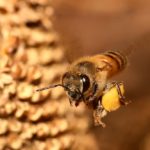Drunk drivers are more likely to get in an accident because the alcohol in their blood impairs vision and delays reaction time. University of Saskatchewan biologists have identified a comparable […] Read more
1.

Locusts in wind tunnels exposed to neonics lost their ability to move themselves where they wanted








